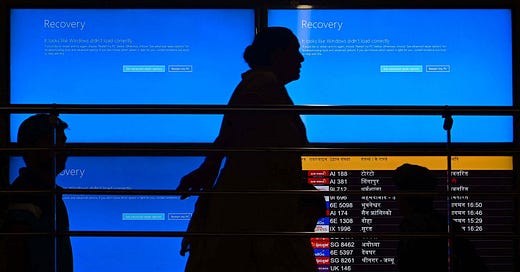Freedom singers, rideshare mafia, seeing without believing: Weekend reads for July 20, 2024
Some links worth your time this weekend
After the shooting at Donald Trump’s rally in Butler Pennsylvania, Democratic leaders largely retreated from the campaign, leaving the public conversation in Republican hands as the GOP kicked off its national convention. Despite promises of a kinder, gentler direction, that convention saw the nomination of far-right memoirist J.D. Vance and a not-unexpected return to the sort of incendiary rhetoric that’s created the conditions for political violence in the first place. And once back in action, Democratic donors and a growing chorus of major leaders continued to argue for a new ticket in November. Meanwhile, Biden got Covid. And a software update error brought down a huge chunk of the Internet, causing the sort of widespread information disaster that we all feared back in Y2K (remember that one?); a reminder of our interconnectedness, and our fragility. It’s been a week.
At The Ink, we’ve spent the week digging deep into questions about how both the Democrats and the Republicans — and the rest of us — got here. We talked to former Republican Max Boot about Reagan’s legacy and how it enabled the rise of Trump. We heard from messaging expert Anat Shenker-Osorio on how Democratic messaging has gone missing in the modern era. Historian and legal scholar Samuel Moyn challenged the very way both parties do politics and argued for a return to F.D.R.’s vision of government if we really want to build a better future.
And as we do each weekend for our paid subscribers, we’ve collected some links to pieces we’ve read this week that we think are well worth sharing, and worth spending your time with this weekend. We hope the articles we’ve collected inspire and entertain you, and even give you some hope for the future.
In case you missed it
Messaging guru Anat Shenker-Osorio told us what the Democrats should have said after the Trump rally shooting, why they didn’t, and what’s at risk if they don’t change.
Yeah, this election is about choosing between competing futures, a future in which we have leaders who respect our freedoms, respect our families, and want to implement common-sense gun safety so that this happens in no place, at no time, to no person, and a future where MAGA Republicans continue in their very well-publicized project to control us, to decide our futures for us, and to unleash more violence time and time again.
Legal scholar and historian Samuel Moyn questioned the Democratic strategy against Trump — and made the case that a New Deal-scale policy platform is the way to remake American politics for the better.
I foresee a long period of feints on both sides in this direction until a politician who hasn’t emerged yet seizes the opportunity to follow F.D.R. and bring together a breakthrough supermajority. We don’t know what the class party platform I mentioned earlier will involve — I have my doubts that it can stick with Joe Manchin-friendly environmental spending or even whether Biden’s antitrust enforcement is the best tactic — but those have definitely been the most promising signs of a break with neoliberalism that both parties seem to recognize is in the offing.
Journalist and historian Max Book explored Reagan’s legacy and talked about how the Great Communicator opened the door for the far-right takeover of the Republican Party that led to Trumpism.
I would say the Republican Southern strategy, playing to white backlash politics, the disdain for actual facts — those are all things that certainly were characteristic of Ronald Reagan's career. But it's also gone to a whole different level that folks in the past would have never envisioned. Certainly, you could not imagine Ronald Reagan, who was such an idealistic believer in American democracy, inciting an insurrection to overthrow an election would be inconceivable.
We argued against the idea of the unilateral, feather-smoothing Democratic Unity Statements that follow in the wake of terrible events — and for a party that continues tell the truth and continues to lead instead of letting Republicans control the story.
Yes, it would be great for us all to be nicer to each other, for this to feel like a more trusting and generous and loving country. But let not the formula of the Unity Statement distract us from the truth: Donald Trump is the head of a movement that has spent nine years pumping hatred and distrust and contempt and post-factualness and vigilantism and, underlying it all, a notion of America as a war of all against all.
A request for those who haven’t yet joined us: The interviews and essays that we share here take research and editing and much more. We work hard, and we are eager to bring on more writers, more voices. But we need your help to keep this going. Join us today to support the kind of independent media you want to exist.
Readings
Catching up with Octavia Butler’s Parable of the Sower
Published in 1993 and set in 2024 — the protagonist’s first journal entry is July 20, 2024 — the story imagines a highly capitalistic America, dominated by industry, corporate greed, and impending doom. At the time of its publication, the novel was categorized as dystopian fiction with a climate catastrophe twist, but Butler later self-labeled it as “speculative fiction.”
As our calendars finally catch up to the timeline of her imagination, Butler seems to have predicted many realities that are playing out this year in her novel. [Yes!]
Keep reading with a 7-day free trial
Subscribe to The.Ink to keep reading this post and get 7 days of free access to the full post archives.









